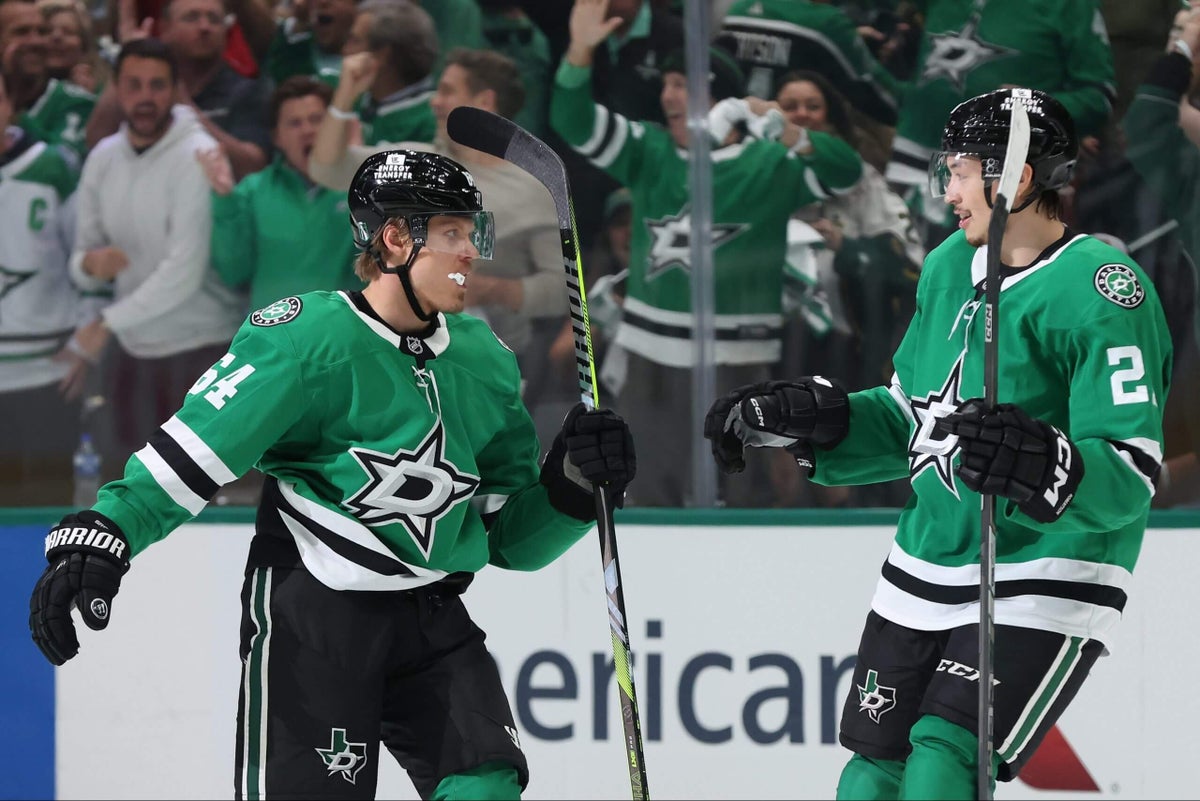FRISCO, Texas — The Dallas Stars began the NHL playoffs without key players like standout defenseman Miro Heiskanen and top goal scorer Jason Robertson. Despite these significant absences, they still managed to reach their third consecutive Western Conference Final.
Both players made their return during the second-round series against Winnipeg. Heiskanen rejoined the team midway through the six-game series after being sidelined for three and a half months recovering from a left knee injury. Now, coach Pete DeBoer is preparing for a Western Final rematch against Edmonton with a roster configuration that has been unavailable for a considerable period.
“This is the first time since January that we`ve had anything resembling our full lineup,” DeBoer commented on Monday. “You never want to go into a battle disadvantaged. For the first two rounds, that`s effectively where we were, and credit to our group, they found a way to battle and get through those series. But it`s certainly a relief not to be in that situation anymore.”
Dallas is set to host Game 1 of the Western Final on Wednesday night. This comes a week after the Oilers concluded their second-round series in Game 5, securing a 1-0 overtime victory over Vegas.
Stars players were granted their second consecutive day off on Monday. If they hadn`t clinched the series against the Jets with a 2-1 overtime win on Saturday night, they would have been facing a decisive Game 7 in Winnipeg.
“We`ve just come through series against two of the league`s top teams, so we feel confident and prepared,” DeBoer stated. “Furthermore, the players who have returned are getting healthier and getting back up to speed.”
Robertson, aged 25 and drafted by the Stars in 2017, similar to Heiskanen, suffered a lower-body injury in the final regular-season game, causing him to miss the entire first-round series against Colorado. After achieving 80 points (35 goals) and playing all 82 games for the third straight regular season, his performance against the Jets in six games included just one assist, eight shots on goal, and 19 total shot attempts.
“He’s no longer a young, inexperienced player,” DeBoer observed. “He isn`t searching for or offering excuses. Instead, he`s looking inward and seeking solutions. He`s been very receptive to coaching. I see significant maturity in his approach.”
Heiskanen required surgery after sustaining an injury from a substantial hit by Vegas captain Mark Stone on January 28th. The Stars defenseman missed the final 32 games of the regular season and the first 10 playoff games before returning for Game 4 against Winnipeg, where he recorded an assist in the team`s 3-1 victory.
“He took the appropriate time needed for recovery,” DeBoer stated. “He wasn`t rushed back, nor did he rush himself. It took him a few games to regain his timing, but I’m not at all surprised to see him performing at this level already.”
In his first game back, Heiskanen played nearly 15 minutes across 19 shifts. His ice time and shifts progressively increased in subsequent games, reaching 18.5 minutes and 22 shifts in Game 5, and over 23.5 minutes across 29 shifts in the series-clinching game.
Heiskanen commented that he felt “pretty normal” after the series against the Jets and was becoming more comfortable with each passing period and game.
Since Heiskanen`s return, Dallas has opted for a lineup configuration of 11 forwards and seven defensemen, though they may soon revert to dressing 12 forwards.
Regardless of the forward count, DeBoer emphasized that Heiskanen`s presence back on the defense has been “game-changing” for the Stars.
“Suddenly, you can slot players into roles where they play fewer minutes, are more effective, and are used in better matchup situations,” DeBoer explained. “Having a player of his caliber back in the lineup allows everyone else to fall into their proper roles.”
This positive impact includes players like Thomas Harley, who scored the series-winning overtime goal against the Jets. Harley received significantly increased ice time during Heiskanen`s absence, seeing his minutes per game rise from approximately 22.5 to nearly 25, while maintaining a similar number of shifts.
“We relied heavily on him [Harley] during that period, so I think he understands,” DeBoer stated. “He’s a more effective player with slightly less ice time, and he also fully grasps how crucial Miro’s return is for our success.”

